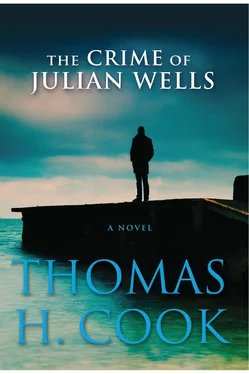Thomas Cook - The Crime of Julian Wells
Здесь есть возможность читать онлайн «Thomas Cook - The Crime of Julian Wells» весь текст электронной книги совершенно бесплатно (целиком полную версию без сокращений). В некоторых случаях можно слушать аудио, скачать через торрент в формате fb2 и присутствует краткое содержание. Год выпуска: 2012, ISBN: 2012, Издательство: Grove Press, Жанр: Криминальный детектив, на английском языке. Описание произведения, (предисловие) а так же отзывы посетителей доступны на портале библиотеки ЛибКат.
- Название:The Crime of Julian Wells
- Автор:
- Издательство:Grove Press
- Жанр:
- Год:2012
- ISBN:9780802194589
- Рейтинг книги:5 / 5. Голосов: 1
-
Избранное:Добавить в избранное
- Отзывы:
-
Ваша оценка:
- 100
- 1
- 2
- 3
- 4
- 5
The Crime of Julian Wells: краткое содержание, описание и аннотация
Предлагаем к чтению аннотацию, описание, краткое содержание или предисловие (зависит от того, что написал сам автор книги «The Crime of Julian Wells»). Если вы не нашли необходимую информацию о книге — напишите в комментариях, мы постараемся отыскать её.
The Crime of Julian Wells — читать онлайн бесплатно полную книгу (весь текст) целиком
Ниже представлен текст книги, разбитый по страницам. Система сохранения места последней прочитанной страницы, позволяет с удобством читать онлайн бесплатно книгу «The Crime of Julian Wells», без необходимости каждый раз заново искать на чём Вы остановились. Поставьте закладку, и сможете в любой момент перейти на страницу, на которой закончили чтение.
Интервал:
Закладка:
“You have been silent for a long time,” Rene said.
His voice seemed to come to me from a far less perilous world.
“Really?” I said. “I didn’t realize.”
Rene drained the rest of his coffee. “Tomorrow we go to Oradour.”
We left Paris the next morning, a warm day but rainy, the city streets shrouded in a gray mist that gradually dissipated, so that we were in bright sun within an hour or so.
The way to Oradour was south from Paris, and it led into the heart of what had once been Vichy France, where the French had been permitted to rule-or pretend to rule-during the German occupation. Here Pierre Laval had signed the infamous order deporting non-French Jews to their deaths, for which, among other of his collaborationist acts, he had been executed by firing squad after the war.
Julian had touched on all this in a letter written while working on Oradour, and in recounting Laval’s death, he had offered an unexpectedly sympathetic portrait of Laval’s final hours, how he’d bungled a suicide attempt by not shaking the bottle before drinking the poison it contained, the way he’d worn a tricolor scarf to the execution site in a twelfth-hour effort to grasp the laurel of patriotism, his final love-of-country declaration, shouted just before the shots rang out: Vive la France!
It was the seamless combination of scope and detail that Julian brought to all his later books, and thinking of it as we closed in upon Oradour, it renewed my admiration for him as a writer, one all the more fortified by what I’d learned from Rene the day before: the solitary life Julian had led in France, the habitue of a seedy bar in Pigalle, the way he’d made himself companion to the alien and the lost.
We reached Oradour in the early afternoon. My plan was to walk through it slowly, absorbing the place in increments as the day waned, so that I would reach the end of my tour at the very time of day when, according to the final passage of his book, Julian had left it for the last time, his research completed, his many hours of interviews and of walking the town’s ghostly streets finally come to their end.
We parked just outside the town by the visitors’ center, and for the next few hours I carried Julian’s book with me as I slowly ambled among its ruined streets, Rene at my side, looking faintly bored. Along with a scattering of other tourists, we strolled among the shattered buildings and stood in the charred nave of the church in which so many had been burned alive, the rest shot as they attempted to escape. I paused at Hotel Avril, where the three Pinede children had hidden, their village burning around them, its smoke and fire finally driving them from their hiding places. Behind the hotel, I saw where, in the midst of their flight, they had encountered an SS soldier who had unaccountably permitted them to escape.
Toward the end of my walk, I paused at the well into which the bodies of several villagers had been tossed. Julian had no doubt stood here, and so I tried to imagine what he might have been thinking as from this vantage point his own eyes had observed the ruins of Oradour.
Surely he would have considered how, for a few hours on June 10, 1944, Oradour had truly been a hell on earth, for in his account of it nothing of that horror had been lost. He’d tried to see the tragedy from 642 angles, but it was his own eyes, at the end of the book, that had seen the town in its grief-stricken repose. That final view had been glimpsed on the Champ de Foire, so when I at last came to that part of town, I opened Julian’s book and read, softly but aloud, its concluding passage:
Twilight fell on the Champ de Foire. The car Dr. Desourteaux drove into Oradour that afternoon still rests where he left it, though no longer in the same state. Time has stripped away its paint and its metal has gone to rust, for even a ruin cannot be spared the assault of further ruin. So also fade the killing sites, the barns at Laudy, Milord, and Bouchole, the Beaulieu forge, the Desourteaux garage, the little wine store on the road to St. Junien, the church where the women and children were gathered, and whose shattered belfry still looks down upon the road that, but for the terrors of that day, those same women and children might later have taken to distant, spared Limoges. The signs that designate these once unheralded spots have begun to peel and soon must be repainted. The bolts that hold them to Oradour’s stone walls will likewise need to be replaced. For ruins, too, must be restored, and with every restoration, Oradour, the town, slips further into Oradour, the event, a process that will reach its end when the last of those who survived those fearful hours pass beyond all further restoration, and the last eyes to have seen Oradour as something other than a martyred village will at last be closed.
After a dramatic pause, I closed the book and looked at Rene.
“Okay,” he said. “So, we go now?”
A few minutes later we reached the hotel Rene had booked for us. It was in a neighboring village, small, quiet, with a restaurant that served us politely, though the waitress appeared somewhat surprised when Rene, so thoroughly French, asked for ketchup for his pommes frites.
“A self-conscious American in France would never do that,” I told him.
He laughed. “Yes, but I am French, so I can do what I want.”
He ate with great relish, like a man accustomed to answering his appetites without reserve, and in that way quite the opposite of Julian, who had lived a far more Spartan life.
“Did you ever see Julian happy?” I asked. “Did you ever see him laugh uncontrollably?”
“He had only black thoughts,” Rene answered. “That was his nature.”
“No, it wasn’t,” I said. “When he was a young man, he was happy and self-confident. He had lots of romances. He would horse around like anyone else.”
“Horse around?”
“Joke with people, that sort of thing.”
“This is what it means, ‘horse around’?”
“Yes.”
Rene took out a pad and made a note. “Julian, yes, you are right, he did not, as you say, ‘horse around,’” he said as he returned the pad to his pocket. “Only sometimes he went to Le Chapeau Noir.” He placed the bowl of his glass between his large hands and rolled it back and forth. “It is like a place from a movie, this bar ,” he said.
“In what way?” I asked.
The glass stilled, as did Rene’s usually darting eyes. “If you go there, you will see,” he said.
11
But why should I go there? Julian had never written about Le Chapeau Noir in any of his books. From time to time it had made an appearance in his letters, though rather sketchily, a line here, a line there. Still, he’d written about it enough for me to have gathered that it was typical of Pigalle, that is to say, rather seedy. I’d imagined it with a cement floor, its tables and chairs a mismatched assemblage. Julian had once described its clientele as a ragged array of expatriates. He’d probably said other things about it, too, though only one of them had stuck, the fact that it was the sort of place where, even when men talk of love, they seem to talk of murder. That had been a telling phrase, which no doubt accounted for the fact that I’d remembered it.
Clearly, Julian had gone to Le Chapeau Noir quite often, and perhaps for that reason, I found myself imagining him as a lone figure, dressed in a worn trench coat, moving down a deserted, rain-slicked street, the lights of Pigalle’s famous windmill shining dimly through a mist.
This was a purely fanciful portrait, of course, and yet, in imagining such a scene, my curiosity was heightened, particularly as to why Julian had described Le Chapeau Noir in a way that was so incontestably sinister, a bar where love and murder mingled with the smoke, curled and twined and became entangled.
Читать дальшеИнтервал:
Закладка:
Похожие книги на «The Crime of Julian Wells»
Представляем Вашему вниманию похожие книги на «The Crime of Julian Wells» списком для выбора. Мы отобрали схожую по названию и смыслу литературу в надежде предоставить читателям больше вариантов отыскать новые, интересные, ещё непрочитанные произведения.
Обсуждение, отзывы о книге «The Crime of Julian Wells» и просто собственные мнения читателей. Оставьте ваши комментарии, напишите, что Вы думаете о произведении, его смысле или главных героях. Укажите что конкретно понравилось, а что нет, и почему Вы так считаете.












